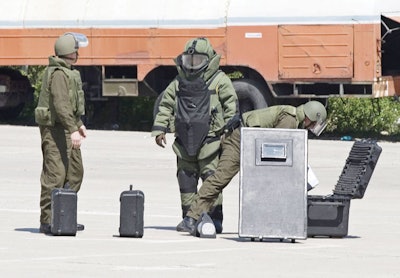 Photo: iStockphoto.com
Photo: iStockphoto.com
Just about every day in this world, somebody, somewhere uses a bomb to murder, maim, or intimidate somebody else. At the time of this writing, the Thai government is coping with a bombing campaign that is targeting tourism sites in Bangkok. A week earlier, officers in Edmonton, Alberta, found an improvised explosive device (IED)—most likely a pipe bomb—during a traffic stop where they also found drugs and weapons.
And the use of IEDs—literally any bombs not manufactured as military ordnance—by lone wolf jihadists, white supremacists, anti-government militants, active shooters, and just plain murderers is on the rise. Easy-to-follow information on how to make explosives from materials you can purchase legally and how to incorporate those explosives into bombs is readily available on the Internet. This makes it easier for people to produce IEDs, and consequently, some experts say bomb threats and bombings are becoming more prevalent and more dangerous.
Which makes most "sane" people wonder why anyone would choose now to join a public safety specialty that laughingly wears t-shirts that read: "I am a bomb technician. If you see me running, try to catch up." Still, despite the danger, the stress, and the fact that bomb techs in many agencies are always on call any time of night or day, there are many more officers who want to wear the fabled bomb tech symbol of laurel leaves, electric bolts, and an aerial known as the "crab" than positions available.
The Process
Becoming a bomb tech is not easy. First you have to get assigned to the squad. And after that the real work begins.
There are some basic requirements established by the FBI that you have to meet to be considered for certification as a bomb tech. First, you have to have at least five years of law enforcement experience. You also have to have served five years on the agency that wants you for its bomb squad. The reasons for these requirements are many, but one reason for this requirement is surely that the FBI does not want to share bomb-making information with people who are not stable professionally. People with large debt loads are also generally rejected for bomb tech training because of fear that money problems might lead a person to sell the information learned in the training to bad actors.
Beyond the basic agency requirements to join the bomb squad and receive FBI training, officers interested in becoming bomb techs should take a self-inventory to see if they are really suited for the job. First, you need to be in good physical condition, as you will be carrying heavy equipment and working in bomb protection suits, which involves serious exertion. Also, if you are claustrophobic or prone to heat stress, a bomb protection suit will be your version of hell.
You also have to ask yourself if you have the aptitude for the job. Successful bomb techs generally have strong mechanical skills and an interest in gadgets and electronics. You will also need to pass written and oral tests, and read and understand technical documents and diagrams. Finally, some experience with explosives—for example, military explosive ordnance disposal experience—is a plus. Just remember, working law enforcement bomb squad duty is very different than military EOD operations.
Getting On a Team
The first step in becoming a bomb tech is to be assigned to a team. It's not easy to get that call. A lot of officers want it, and most who have the job are not looking to move on.
But when a spot comes open, you need to be in position for the opportunity. Like any prized job in or out of law enforcement, you have to network in order to get assigned to the bomb squad.
Networking begins with letting the current bomb squad, and especially the commander of the squad, know you are interested in the job and you meet the requirements. Don't make a pest of yourself. But you don't get anything in this world unless you ask for it.
Of course, asking for it is not enough. You have to have something to offer. For example, investigative or SWAT skills can be a plus for any officer seeking assignment to the bomb squad. You also have to back up your expression of interest in the job, with action. Try to attend any bomb tech training sessions that you can.
Destination Huntsville
You're not a certified law enforcement bomb tech until you have attended and passed the FBI's training at the Hazardous Devices School (HDS) in Huntsville, Ala. But don't expect to head to Alabama the day you are named to the squad. It's not unheard of for it to take more than a year to get your ticket to Huntsville.
Every time you walk into the classroom building at HDS you will be reminded how important it is to excel in this training. Right outside the building is a monument to all the law enforcement bomb techs killed in the line of duty. That monument will be one of the many reminders of the dangers of being a bomb tech that you will receive every day during the six-week-long HDS.
HDS sits on 300 acres and comprises training villages for scenario-based work, explosives ranges for vivid demonstration of the power of explosions, and classrooms for learning what to do to prevent such explosions.
Since 1971 more than 20,000 certified bomb techs have trained at HDS and some 3,000 of them are still active on more than 460 full-time or part-time bomb squads nationwide. And once you leave Huntsville with your certificate you will be one of them.
The Job
There's a cliché in TV and movies of bomb techs trying to defuse devices with wire cutters and sweaty guile or handling suspicious packages without bomb protection suits. Fortunately, such instances, which actually happened some 40 years ago, are now rare.
Today, the primary goal of any bomb squad is to keep the public, fellow officers, and themselves far away from the catastrophic effects of an explosion. Which means the robot is going in instead of the bomb tech, if possible. The robot can carry equipment that will allow bomb techs to check out suspicious packages remotely. It can also disrupt the suspicious package with a stream of high-pressure water and render it "safe."
Of course, there are still times when bomb techs have to suit up and go downrange. So before you start the process of becoming a bomb tech, you need to ask yourself if you really want to spend a part of a hot summer day inside a heavy and hot bomb protection suit walking toward a suspicious package and sweating from pores you didn't know you had. Because it will happen for real, and it will happen in training.
Also, remember that the job of a bomb tech is about more than just rendering suspicious packages and known IEDs "safe." You will be called on to remove a live grenade/war trophy from some deceased veteran's house or from the Goodwill box where his family unthinkingly tossed it, and to safely dispose of unserviceable ammunition, unwanted commercial explosives, and legally seized fireworks. Some SWAT teams also call on their agencies' bomb techs to perform explosive breaching.
And once an IED is either rendered safe or explodes, your job has just begun. As a bomb tech and investigator, you will assist the detectives and crime scene technicians, you will write reports, and you will testify in court, just like any other law enforcement officer.













